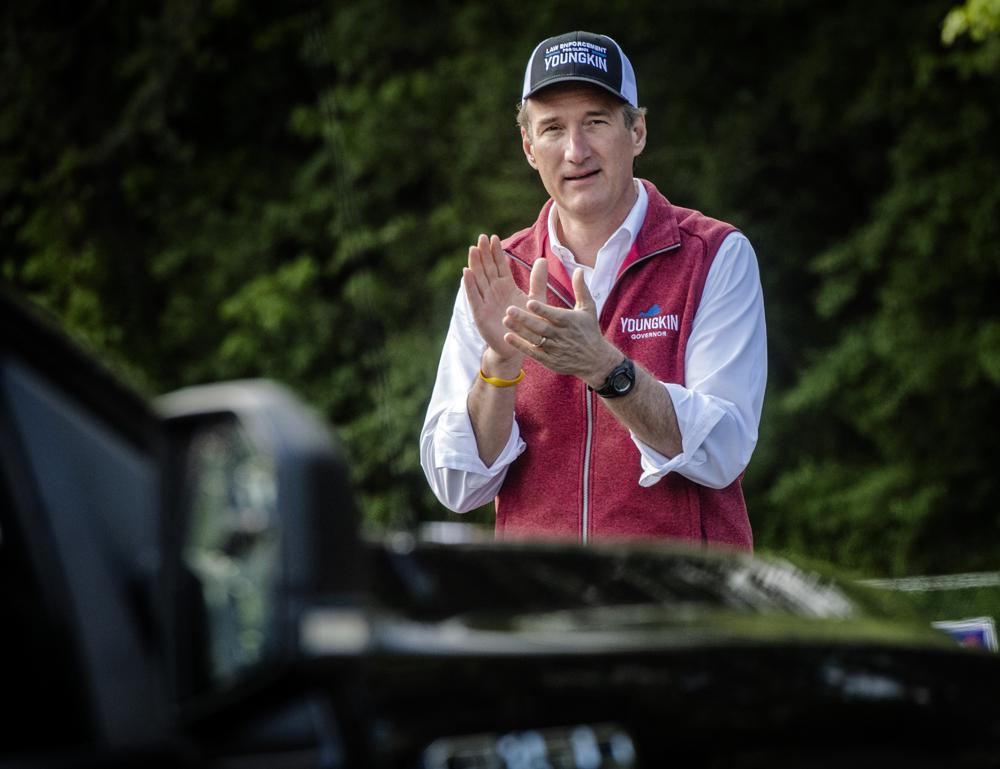
FALLS CHURCH, Va. (AP) — Glenn Youngkin, a political newcomer who campaigned as a conservative, Christian outsider, bested a field of seven candidates to emerge as Virginia Republicans’ nominee for governor, in a year when the GOP hopes to end a 12-year losing streak in statewide races.
Youngkin defeated a hard-right contender in state Sen. Amanda Chase, who closely aligned herself with former President Donald Trump, as well as an establishment candidate, former House Speaker Kirk Cox, who had more than 30 years’ experience in government as well as the endorsements of former governors George Allen and Bob McDonnell.
While Youngkin did not embrace Trump to the same extent as Chase, he spoke favorably of the former president during the campaign. He also made “election integrity” a top issue in his campaign, allowing him to appeal to Trump voters who still believe the 2020 election was stolen from him without having to invoke Trump’s name directly.
In the sixth and final round of counting on Monday night, Youngkin passed the 50% threshold to clinch the nomination, and his closest remaining opponent, Pete Snynder, issued a tweet conceding: “I send my heartfelt congratulations to @glennyoungkin on a tremendous race + deserved win.”
The state party’s website showed Youngkin with around 55% of the vote as final ballots were being tallied late Monday night.
“I am prepared to lead, excited to serve and profoundly humbled by the trust the people have placed in me.,” Youngkin said on Twitter. “Virginians have made it clear that they are ready for a political outsider with proven business experience to bring real change in Richmond.”
In a statement late Monday, the Virginia Republican Party celebrated Youngkin’s nomination, calling him a “homegrown Virginian” who had “nothing handed to him.”
“From his life experiences, Glenn has developed the skills and character to lead Virginia with humility and courage,” party officials said. “He has the know-how to get Virginia moving again and rebuild it into the best place to live, work, and raise a family in America.”
Party Chairman Rich Anderson said Youngkin ran a “flawless campaign,” adding that he looked forward to throwing “the full force of the Republican Party of Virginia behind him in the coming months.”
The state Democratic Party painted a different picture, calling Youngkin a “pro-Trump extremist.”
“Throughout this campaign, Youngkin has advanced Trump’s dangerous election conspiracy theories, opposed critical COVID-19 relief for working families and small businesses, and threatened to gut Virginians’ health care,” Virginia Democratic Party Chairwoman Susan Swecker said in a statement.
More than 30,000 delegates cast ballots Saturday at what the Republican Party of Virginia is calling an “unassembled convention” to choose their nominees for governor, lieutenant governor and attorney general.
With no candidate garnering a majority after the first round, the winner was determined in part by whom delegates listed as their second and third choices among the seven candidates vying for the spot.
Under the ranked-choice voting system implemented by the party, the votes of the last-place candidate, former Roanoke Sheriff Octavia Johnson, were redistributed to the six remaining candidates based on whom those delegates designated as their second choice.
The process was repeated in subsequent rounds until Youngkin gained the majority.
Youngkin, a former CEO of The Carlyle Group investment firm, is making his first run for public office. He lent his campaign more than $5 million and spent more than any other candidate through March 31, according to data from the Virginia Public Access Project. He campaigned as a “conservative Christian outsider” and highlighted his business experience.
The party began counting ballots in the attorney general race on Sunday. Delegate Jason Miyares won a close race after three rounds of balloting over hard-right candidate Chuck Smith.
Smith’s surprisingly strong showing was interpreted by some as a good sign for Chase, a hard-right gubernatorial candidate who has been censured in the General Assembly in a bipartisan vote and is most closely associated with former President Donald Trump.
Chase, though, finished in third place. She has suggested she might run as an independent if she feels like the nomination process was unfair.
Democrats will choose their nominee next month in a state-run primary. Former governor Terry McAuliffe is the front-runner in a field of five candidates.
Virginia bars incumbent governors from seeking reelection, so Democratic Gov. Ralph Northam is barred from seeking a second term this year.
Virginia is the only state with an open-seat gubernatorial contest this year; the race is being closely scrutinized as an early signal of each party’s political strength heading into the 2022 congressional elections.
Republicans have not won a statewide race in Virginia since 2009. But Republicans have some hope of ending their drought this year; since 1973, only once has the party controlling the White House gone on to win the governor’s race in Virginia the next year.
The convention was open to Virginia voters who pre-registered as delegates. People who had voted in past Democratic primaries were allowed to participate if they renounced their earlier Democratic votes and promised to support the Republican nominees in November.